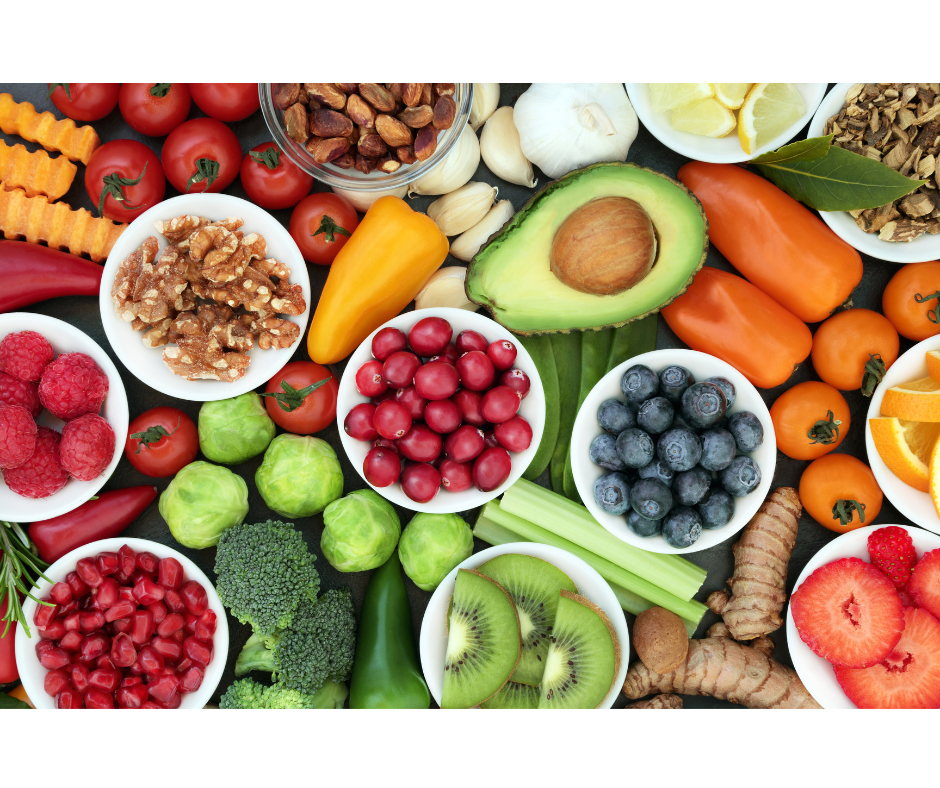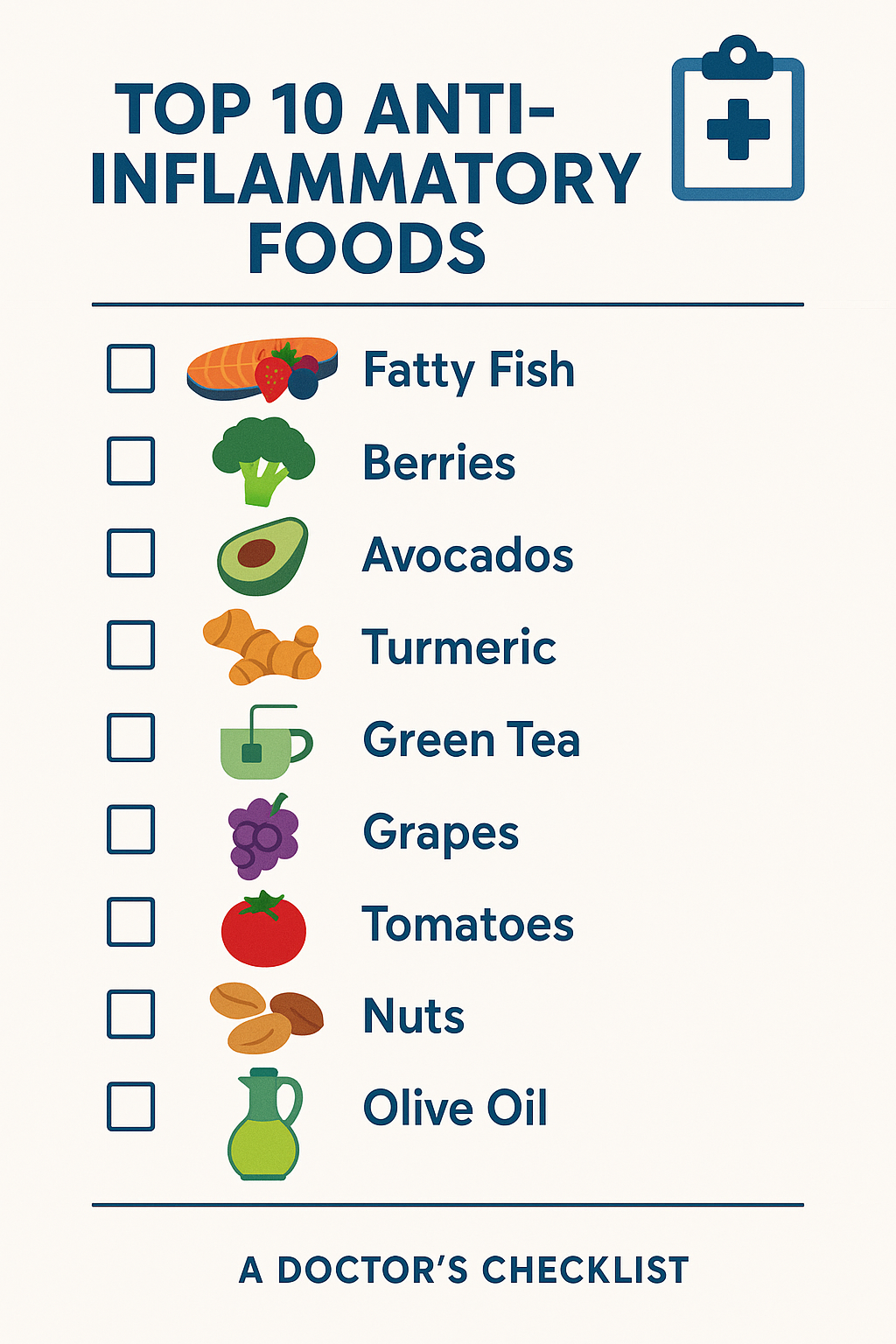Anti-Inflammatory Foods: A Doctor’s List


Introduction
Inflammation is the body’s natural defense mechanism, designed to protect against infections, injuries, and toxins. However, when this process becomes chronic, it silently contributes to a wide range of diseases—ranging from heart disease and diabetes to arthritis and even certain cancers. As physicians, we see the consequences of uncontrolled inflammation every day. The good news is that lifestyle interventions, especially diet, can play a significant role in reducing inflammation and restoring balance. Among these, anti-inflammatory foods stand out as simple yet powerful tools for health maintenance.
General Readers
For the general public, it is important to understand that inflammation is not always harmful. Short-term inflammation helps the body heal after an injury or fight off infections. The problem arises when inflammation becomes long-standing, often due to poor diet, lack of exercise, stress, and environmental toxins.
Including anti-inflammatory foods in your daily meals can help reduce risks of chronic diseases, improve energy, and promote healthy aging. Foods rich in omega-3 fatty acids (like fatty fish, flaxseeds, walnuts), antioxidants (like berries, leafy greens, turmeric, and green tea), and healthy oils (like extra-virgin olive oil) should form a core part of your diet. On the other hand, excessive intake of processed foods, sugary beverages, and refined carbohydrates fuels inflammation and should be avoided.
Medical Students
From a medical perspective, chronic inflammation is mediated through pro-inflammatory cytokines such as IL-6, TNF-alpha, and CRP, which play central roles in the pathogenesis of many diseases. Diet influences these mediators via molecular mechanisms, including effects on NF-kB signaling and oxidative stress pathways.
Medical students should note:
• Fruits and Vegetables: Rich in flavonoids and polyphenols that downregulate pro-inflammatory mediators.
• Omega-3 Fatty Acids: Compete with arachidonic acid in the eicosanoid pathway, reducing pro-inflammatory prostaglandins and leukotrienes.
• Turmeric (Curcumin): Inhibits NF-kB and COX-2 expression.
• Green Tea (EGCG): Modulates oxidative stress and inflammatory cytokines.
This knowledge is not just theoretical—it is highly relevant to patient care and future preventive strategies.

Young Doctors
For young physicians entering clinical practice, it is vital to integrate dietary advice into patient consultations. Pharmacological therapies remain primary treatment options for inflammatory diseases, but dietary measures can reduce drug dependency, minimize side effects, and improve overall outcomes.
Practical advice:
• For arthritis patients, recommend fatty fish, turmeric, and ginger.
• For patients with cardiovascular risks, emphasize extra-virgin olive oil, nuts, and green leafy vegetables.
• For diabetic patients, advise whole grains, berries, and legumes, while discouraging processed foods.
Always remember: a physician’s guidance on nutrition carries more weight with patients than generalized health advice found on the internet. Counseling patients about anti-inflammatory foods strengthens the doctor-patient relationship and reinforces holistic care.
General Practitioners
As frontline doctors, general practitioners are in the best position to educate communities about the importance of anti-inflammatory diets. Screening patients for obesity, diabetes, hypertension, arthritis, or autoimmune conditions should include dietary counseling.
Practical strategies for GPs:
• Use food substitution advice: replace refined oils with olive oil, white bread with whole grains, and sugary drinks with green tea or water.
• Create simple dietary charts for patients.
• Encourage seasonal fruits and vegetables, which are affordable and effective.
• Regularly assess patients’ CRP levels in chronic disease management and use diet modification as part of the treatment plan.
In this way, GPs can bridge the gap between pharmacological management and lifestyle interventions.
When to See the Doctor
While anti-inflammatory foods are beneficial, they are not a replacement for medical care. Patients should seek a physician’s advice if:
• They have persistent joint pain, swelling, or morning stiffness.
• They experience unexplained fatigue, weight loss, or fevers.
• They suffer from digestive complaints like chronic diarrhea or bloating.
• They are at high risk of cardiovascular disease or diabetes and need personalized dietary plans.
Self-treatment with diet alone can delay diagnosis of serious underlying conditions, so medical supervision is always necessary.
Conclusion
Inflammation is a double-edged sword: protective when acute, but destructive when chronic. Anti-inflammatory foods provide a natural, accessible, and evidence-based way to reduce this silent burden on health. As physicians, we must continue to emphasize that nutrition is not an alternative therapy—it is integral to disease prevention and management. Incorporating these foods into daily life can improve longevity, reduce morbidity, and enhance quality of life.
A plate filled with colorful vegetables, omega-3–rich sources, antioxidant fruits, and healthy oils is not just a meal—it is preventive medicine.
